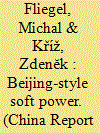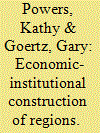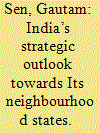|
|
|
Sort Order |
|
|
|
Items / Page
|
|
|
|
|
|
|
| Srl | Item |
| 1 |
ID:
170655


|
|
|
|
|
| Summary/Abstract |
This article examines China’s unique soft power conceptualisation, which differs from the American coinage. It contributes to the existing literature by demonstrating how soft power is theorised by Chinese academicians and policymakers in a distinct way. That means, according to China’s own tradition, predating the term. Unlike in America, where soft power is largely developed freely, in China, it is highly centralised. As a rising power, the People’s Republic initially concentrates on building domestic soft power, primarily through socialist culture and virtuous governance. These are in turn displayed to the outside world. Beijing uses multiple channels to tell the China story and has been setting up international platforms to portray itself as a responsible global actor. Several soft power indexes show that China holds a relatively positive image in Africa and South America. In Asia, views are mixed, while in Europe and North America, they remain low.
|
|
|
|
|
|
|
|
|
|
|
|
|
|
|
|
| 2 |
ID:
108507


|
|
|
|
|
| Publication |
2011.
|
| Summary/Abstract |
The international relations literature on regionalism, both in economic and security issues, has grown dramatically over the last 15 years. One of the ongoing issues discussed in most articles and books is the conceptualisation of 'region'. Instead of thinking about regions using notions of interdependence and interaction we take a social constructivist approach, whereby states themselves define regions via the construction of regional economic institutions (REI). We explore how a conceptualisation of region based on REIs contrasts with various related concepts such as regional system, and regional IGO. Empirically, we show that most all countries belong to at least one important regional economic institution, REI, (for example, EU, Mercosur, ASEAN, etc). In short, the world is dividing itself into regions by the creation of regional economic institutions. We contrast our economic-institutional approach to regions with Buzan and Wæver's 'regional security complexes' which is based on security dependence. There are interesting agreements and disagreements between their approach and our economic-institutional approach to defining regions. It is perhaps not surprising that many REIs have taken on security roles, which we briefly show by looking at military alliances embedded in REIs. This suggests that policymakers are creating regions through institutional innovations that link economic and security issues.
|
|
|
|
|
|
|
|
|
|
|
|
|
|
|
|
| 3 |
ID:
116891


|
|
|
|
|
| Publication |
2012.
|
| Summary/Abstract |
This article accounts for the conceptualisation of development by the Palestinian Islamist party, Hamas. It concludes that Hamas's position on development can be seen in either two ways: 1) as broadly similar to mainstream neoliberal development; or 2) as significantly different and an alternative type of development. Which view taken depends on whether an Orientalist or non-Orientalist approach to understanding development is employed (with Orientalism linking development, modernity and progress with the West and denying it to the non-West). While an Orientalist view assumes that development only occurs within narrow parameters, obliging the non-West to 'catch up', a non-Orientalist approach would study Islam on its own terms-and therefore see Hamas's approach to development as an alternative to mainstream thinking. To account for this, the article studies the basis of knowledge in Orientalism and Islamic thought alongside Hamas's rise from its foundation in 1987 to its control of Gaza in mid-2007.
|
|
|
|
|
|
|
|
|
|
|
|
|
|
|
|
| 4 |
ID:
185774


|
|
|
|
|
| Summary/Abstract |
The purpose of the paper is to examine the problematics that the neighbourhood states face, their fault lines, and how they affect the
peace and stability in South Asia in general and towards India in particular. The analysis of the same would lead us to define India’s
strategic outlook and decision-making. It would hence be necessary to cast India’s Strategic outlook in relation to the conceptualisation of the term National Interest, the emerging global order and the fault lines in the new Global Order, and a brief understanding of the phenomenon of nuclear proliferation, collapse of Communism and keeping in mind Huntington’s postulation of the clash of civilisation and its aftereffects as we see in the 21st century.
|
|
|
|
|
|
|
|
|
|
|
|
|
|
|
|
| 5 |
ID:
167314


|
|
|
|
|
| Summary/Abstract |
In recent years, the Trump administration, embracing the principle of ‘America First’, adopts protectionism, doubts climate change and withdraws from many multilateral regimes in fields of trade, security, politics and global governance, while China firmly supports economic globalisation and free trade, adheres to peaceful development and advocates cooperation, openness, inclusiveness and mutual benefits. In these circumstances, there appears a heated debate on the shift of global leadership in academia and media, focusing on China. Beginning with summing up typical opinions about the issue of global leadership concerning the USA and China, the author conceptualises ‘global leadership’, analyses the nature and state of USA’s global leadership, discusses the Trump administration’s foreign policies and USA’s global leadership and comments China’s views and policies concerning global leadership. This article primarily argues that leadership, unlike hegemony, is not a zero-sum relationship, and there may be more than one country harmoniously and complementarily exerting leading roles in global affairs. Only by clearly differentiating hegemony and leadership can great powers better deal with their relations.
|
|
|
|
|
|
|
|
|
|
|
|
|
|
|
|
|
|
|
|
|